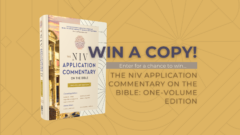There seems to be a great deal of disagreement about how we ought to define the word discernment. A quick Google check reveals a wide variety. One says it is “perception of that which is obscure” and another says “the ability to feel or perceive something with the use of the mind and the senses.” Several definitions revolve around decision making, saying discernment is “prayerful reflection and discussion before taking a major decision” or “discovering, with God’s help, God’s will for our lives.” A more thorough definition reads, “Discernment is a process of prayerful reflection which leads a person or community to understanding of God’s call at a given time or in particular circumstances of life. It involves listening to God in all the ways God communicates with us: in prayer, in the scriptures, through the Church and the world, in personal experience, and in other people.” I’d suggest that this final definition is similar to what many Christians think of when they consider discernment. To them discernment is a gift or ability that allows them to make good decisions. People who make poor decisions in life are those who lack discernment.
There are others who feel discernment relates to making binary distinctions between right and wrong, good and bad. J. Mark Bertrand discusses these people in an article entitled “Diss Isn’t Discernment,” focusing particular attention on so-called watchblogs.
[I]t occured to me that one of the problems with the self-appointed “watchblogs” where such logical errors are frequently coined, one of the reasons they’re taken a bit too seriously, is that we’ve allowed a flawed view of discernment to hijack the discourse. We see that the particulars are wrong, especially when the watchbloggers address things about which we have personal knowledge, but we make the mistake of thinking only the particulars are wrong, when perhaps it’s the whole system that’s at fault. In other words, maybe the watchblogging world operates on an incorrect notion of what discernment is.
What is this incorrect notion? Bertrand goes on to explain,
There are two groups of people and things: the good and the bad. Good is, well, good … and bad is off limits. The art of discernment involves examining them and determining which group to categorize them in. Everyone is called to make these category distinctions, but some of us are also appointed by God to make them for others. Because most people are undiscerning, it falls on the discerning few to lead the way, especially when it comes to exposing bad people and things that are generally held (by the undiscerning masses) to be good — the wolves in sheep’s clothing.
In other words, those with the gift of discernment are called to make the binary distinctions between good and bad and to relegate people in either category. Further, as “experts” in discernment, they instruct others how to categorize people and things. While this is a simplistic summary of such people, it is one that bears at least some degree of truth.
Dennis E. Johnson, Professor of Practical Theology and Academic Dean at Westminster Seminary California, makes a similar point when considering non-Christian scholarship:
You realize, of course, that this makes our study of theology less outwardly secure. We cannot simply compile a list of “safe” authors, stamp them with the Reformed equivalent of imprimatur or nihil obstat, and then confine our reading to them. We must do the hard work of exercising discernment – sentence by sentence, paragraph by paragraph, argument by argument. Facts, insights, perspectives, and methods must all be tested in the light of the principles of Scripture. And we must keep alive our consciousness of dependence on Christ, in whom are hidden all the treasures of wisdom and knowledge. Our safety is not in avoiding the ideas of the unbelieving world; our safety is in union with Christ, who transforms the mind of those who trust in him.
There is hard work to be done in sorting and sifting the teachings of other humans, especially when we realize that we cannot simply cubbyhole the unpleasant or challenging ideas away and ignore them. But this hard work, like other exercise, gives us the necessary muscle tone to serve and lead God’s people. “Solid food is for the mature, who by constant use have trained themselves to distinguish good from evil” (Heb. 5:14).
Discernment is difficult, and sometimes laborious work. If my forthcoming book is to be believed, it is also a discipline we must develop as Christians.
While the distinctions between good and evil are not always perfectly simple and clear, I do not wish to downplay the fact that truth and evil exist and are in constant opposition to one another. The very word discernment and its close relative discrimination imply the task of making such distinctions. In A Call To Discernment Jay Adams points out that the word translated in Scripture as discrimination means “to separate things from one another at their points of difference in order to distinguish them.” In Reckless Faith John MacArthur says, “discernment is the process of making careful distinctions in our thinking about truth. The discerning person is the one who draws a clear contrast between truth and error.” The biblical method for doing this is one I have introduced in the past in my “discernment filter” and is drawn from 1 Thessalonians 5:21-22 which exhorts Christians to “test everything; hold fast to what is good. Abstain from every form of evil.”
I am not entirely comfortable with any of these definitions of discernment. I have spent a great deal of time studying biblical discernment and have read every book I can find dealing with the subject. It is my understanding that discernment is not telling other people what to think. It is not condemning those who do not think the way you do, even if you are convinced from Scripture and from plain reason that they are wrong. It is not an exercise in making good decisions in life.
I spent the better part of a day last week wrestling with a definition for discernment. I eventually arrived at a long and a short definition. The short and simple definition I came up with is this: Discernment is the ability to think biblically about all areas of life. A longer, more thorough definition (which is also much more difficult to remember) might be something like this: Spiritual discernment is the God-given, Spirit-empowered ability to understand and interpret truth, so that we can apply truth to our lives, thus bringing glory to God and furthering our enjoyment of Him. It remains somewhat clunky and obtuse, but I hope to improve at as my work on the book continues.
In the meantime, I would love some feedback on these definitions and am eager to hear how you think discernment should be defined. If you are aware of any definitions of the word, particularly if they were written by Christians, I would be eager to hear of them.










